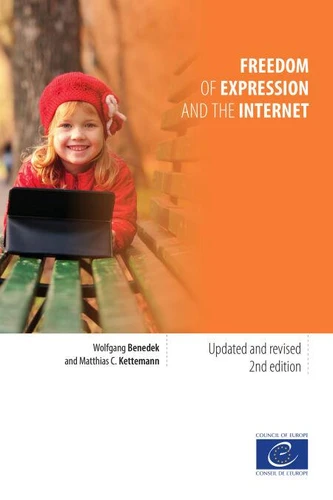Freedom of expression and the internet. Updated and revised 2nd edition
Par : ,Formats :
Disponible dans votre compte client Decitre ou Furet du Nord dès validation de votre commande. Le format ePub est :
- Compatible avec une lecture sur My Vivlio (smartphone, tablette, ordinateur)
- Compatible avec une lecture sur liseuses Vivlio
- Pour les liseuses autres que Vivlio, vous devez utiliser le logiciel Adobe Digital Edition. Non compatible avec la lecture sur les liseuses Kindle, Remarkable et Sony
 , qui est-ce ?
, qui est-ce ?Notre partenaire de plateforme de lecture numérique où vous retrouverez l'ensemble de vos ebooks gratuitement
Pour en savoir plus sur nos ebooks, consultez notre aide en ligne ici
- FormatePub
- ISBN978-92-871-8723-9
- EAN9789287187239
- Date de parution08/09/2020
- Protection num.pas de protection
- Infos supplémentairesepub
- ÉditeurConseil de l'Europe
Résumé
An invaluable resource for students of law, politics, international relations and technology as well as for diplomats and civil society actors, this publication demonstrates how the Council of Europe contributes to ensuring that everyone's voice online can be heard. This is key to sustainable, human rights oriented and people-centred digitalisation.
Human rights matter on the internet. Without freedom of expression, people cannot participate in everything that the information society has to offer.
Yet online free speech is in danger. Between state laws, private rules and algorithms, full participation in the online communicative space faces many challenges. This publication explores the profound impact of the internet on free expression and how it can be effectively secured online. The second, updated edition of this introduction into the protection of freedom of expression online answers essential questions regarding the extent and limits of freedom of expression online and the role of social networks, courts, states and organisations in online communication spaces.
In clear language, with vivid examples spanning two decades of internet law, the authors answer questions on freedom of expression in cyberspace. Addressing issues from the protection of bloggers to the right to access online information, the publication also shows the importance of the standard-setting, monitoring and promotion activities of international and non-governmental organisations and includes a chapter on relevant national practice.
It pays special attention to the role of European human rights law and the Council of Europe as this region's most important human rights organisation.
Yet online free speech is in danger. Between state laws, private rules and algorithms, full participation in the online communicative space faces many challenges. This publication explores the profound impact of the internet on free expression and how it can be effectively secured online. The second, updated edition of this introduction into the protection of freedom of expression online answers essential questions regarding the extent and limits of freedom of expression online and the role of social networks, courts, states and organisations in online communication spaces.
In clear language, with vivid examples spanning two decades of internet law, the authors answer questions on freedom of expression in cyberspace. Addressing issues from the protection of bloggers to the right to access online information, the publication also shows the importance of the standard-setting, monitoring and promotion activities of international and non-governmental organisations and includes a chapter on relevant national practice.
It pays special attention to the role of European human rights law and the Council of Europe as this region's most important human rights organisation.
An invaluable resource for students of law, politics, international relations and technology as well as for diplomats and civil society actors, this publication demonstrates how the Council of Europe contributes to ensuring that everyone's voice online can be heard. This is key to sustainable, human rights oriented and people-centred digitalisation.
Human rights matter on the internet. Without freedom of expression, people cannot participate in everything that the information society has to offer.
Yet online free speech is in danger. Between state laws, private rules and algorithms, full participation in the online communicative space faces many challenges. This publication explores the profound impact of the internet on free expression and how it can be effectively secured online. The second, updated edition of this introduction into the protection of freedom of expression online answers essential questions regarding the extent and limits of freedom of expression online and the role of social networks, courts, states and organisations in online communication spaces.
In clear language, with vivid examples spanning two decades of internet law, the authors answer questions on freedom of expression in cyberspace. Addressing issues from the protection of bloggers to the right to access online information, the publication also shows the importance of the standard-setting, monitoring and promotion activities of international and non-governmental organisations and includes a chapter on relevant national practice.
It pays special attention to the role of European human rights law and the Council of Europe as this region's most important human rights organisation.
Yet online free speech is in danger. Between state laws, private rules and algorithms, full participation in the online communicative space faces many challenges. This publication explores the profound impact of the internet on free expression and how it can be effectively secured online. The second, updated edition of this introduction into the protection of freedom of expression online answers essential questions regarding the extent and limits of freedom of expression online and the role of social networks, courts, states and organisations in online communication spaces.
In clear language, with vivid examples spanning two decades of internet law, the authors answer questions on freedom of expression in cyberspace. Addressing issues from the protection of bloggers to the right to access online information, the publication also shows the importance of the standard-setting, monitoring and promotion activities of international and non-governmental organisations and includes a chapter on relevant national practice.
It pays special attention to the role of European human rights law and the Council of Europe as this region's most important human rights organisation.





